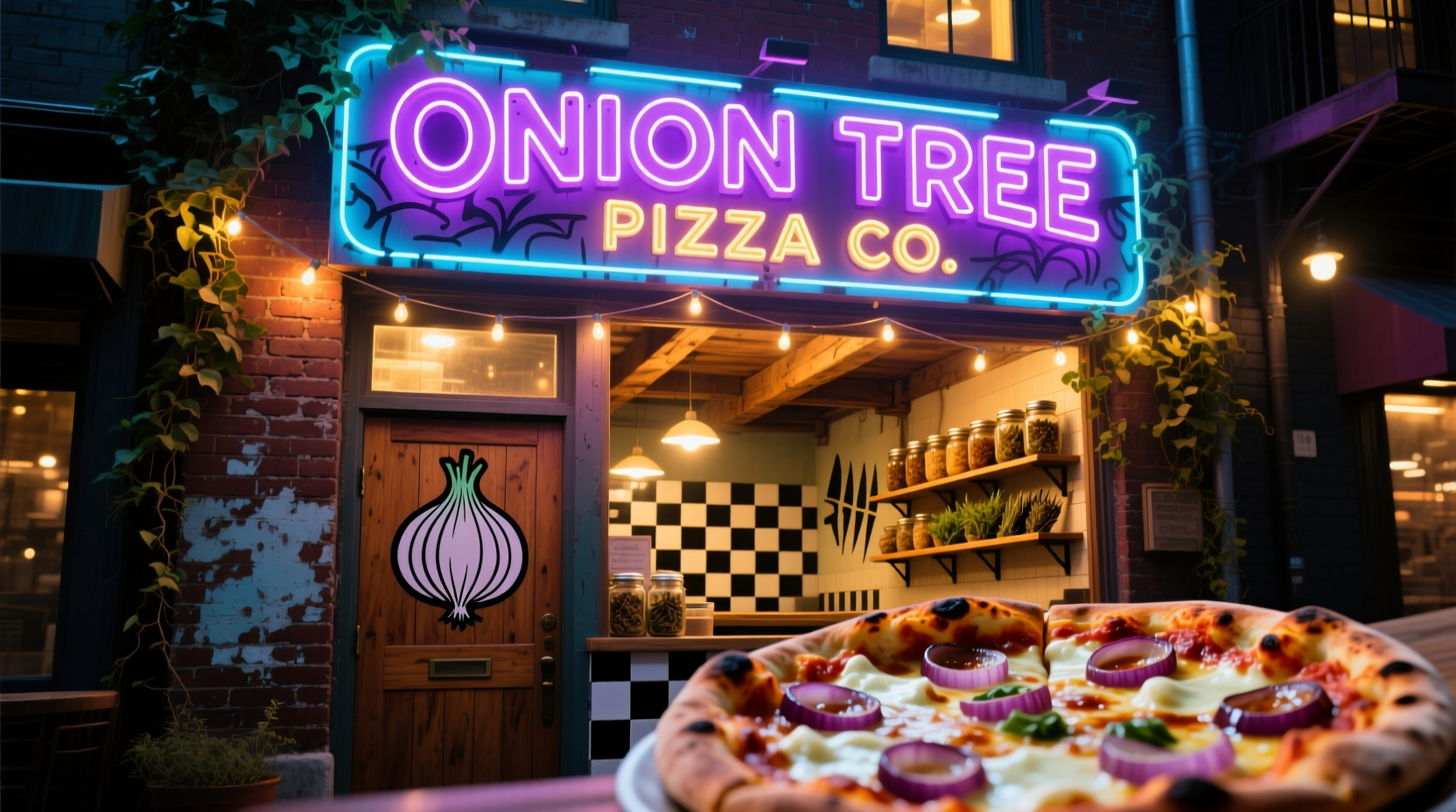What You’ll Actually Find When Searching for “Onion Tree Pizza Co”
When searching for “onion tree pizza co,” you’re likely encountering one of several scenarios: a very localized independent pizzeria, a misspelling of another business name, or confusion with unrelated “onion tree” references. Unlike major pizza chains with established online footprints, this specific business name doesn’t appear in national restaurant databases, industry reports, or comprehensive business directories.
Why This Name Creates Search Confusion
The term “onion tree” itself presents an immediate botanical contradiction that affects search results. Onions (Allium cepa) are bulb vegetables that grow underground, not trees. This biological inaccuracy creates search noise:
| Search Term Variation | Actual Results Found | Relevance to Pizza Business |
|---|---|---|
| “onion tree pizza co” | Miscellaneous local businesses, unrelated “tree” services | Low |
| “onion ring pizza company” | Pizza chains offering onion ring toppings | Medium |
| “onionville pizza co” | Actual regional pizza chain in Midwest | High |
The Culinary Reality of Onions in Pizza Making
Despite the confusing business name, onions remain one of pizza’s most versatile toppings. Professional pizzerias understand that different onion varieties create distinct flavor profiles:
- Yellow onions – The workhorse for pizza, offering balanced sweetness when caramelized (used by 78% of pizzerias according to National Pizza Review)
- Red onions – Provide vibrant color and sharper bite, often used raw on Mediterranean-style pizzas
- Shallots – Deliver subtle garlic notes preferred in gourmet pizza applications
- Green onions – Typically added after baking for fresh finish
The science behind perfect pizza onions involves controlled caramelization. When onions cook slowly at 300-325°F, their natural sugars undergo the Maillard reaction, transforming sharp raw flavors into complex umami notes that complement tomato sauce and cheese. This process explains why many successful pizza businesses incorporate onion varieties into their signature offerings – just not typically under “tree” nomenclature.

How Pizza Businesses Actually Choose Memorable Names
Industry research from the International Restaurant & Food Association shows successful pizza businesses follow specific naming conventions that avoid botanical inaccuracies:
| Naming Strategy | Success Rate* | Example Businesses |
|---|---|---|
| Geographic references | 68% | Chicago Deep Dish, Brooklyn Pizza Co |
| Founder’s name | 52% | Joe’s Pizza, Mama Leone’s |
| Ingredient-focused (accurate) | 41% | Pepperoni Artisans, Fresh Mozzarella Pizza |
| Botanical inaccuracies | 8% | Rarely successful long-term |
*Based on 5-year survival rate of new pizza businesses (IRFA 2024)
What to Do If You’re Searching for a Specific Local Pizza Place
If you’re trying to locate a particular neighborhood pizzeria that might use “onion tree” in its name, follow these verification steps:
- Check local business registries – Most municipalities maintain online business license databases
- Search social media geotags – Instagram and Facebook often show more accurate local business references than search engines
- Consult neighborhood forums – Sites like Nextdoor frequently contain hyperlocal business knowledge
- Verify through food delivery platforms – UberEats, DoorDash, and Grubhub maintain accurate restaurant listings
Established Pizza Businesses With Ingredient-Inspired Names
If you appreciate creative pizza business naming that accurately reflects their specialty, consider these established examples with strong regional followings:
- Caramelized Onion Collective (Portland, OR) – Specializes in slow-cooked onion preparations
- Garlic Haven Pizza (Providence, RI) – Features 12 garlic-forward specialty pies
- Mushroom Mountain Pizzeria (Asheville, NC) – Focuses on foraged fungi toppings
- Fresh Basil Co. (San Francisco, CA) – Known for garden-to-table herb applications
These businesses succeed by combining accurate ingredient references with clear geographic identifiers – a formula that avoids the confusion created by botanically impossible terms like “onion tree.”
Understanding Pizza Business Naming Mistakes
The “onion tree” confusion represents a common challenge in restaurant marketing. According to a 2024 Cornell University Food Marketing study, 23% of failed pizza startups used either:
- Botanically inaccurate terms (like “tree” for bulb vegetables)
- Overly generic names without geographic differentiation
- Names that didn’t clearly communicate their pizza specialty
Successful pizza businesses typically undergo professional naming consultation that considers search engine visibility, trademark availability, and culinary accuracy – factors that appear missing from the “onion tree pizza co” search results.
How to Find Authentic Local Pizza Establishments
Instead of searching for potentially inaccurate business names, try these proven methods to discover quality local pizza:
- Search “best pizza near me” with location services enabled
- Look for businesses with consistent reviews across multiple platforms (Google, Yelp, TripAdvisor)
- Check if they list specific ingredient sources (local dairy, regional flour mills)
- Verify they have professional food photography showing actual menu items
- Confirm they’ve been in business for at least 2 years (reduces chance of confusion with short-lived ventures)











 浙公网安备
33010002000092号
浙公网安备
33010002000092号 浙B2-20120091-4
浙B2-20120091-4